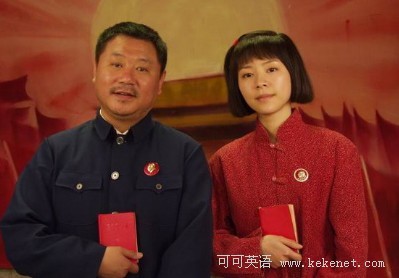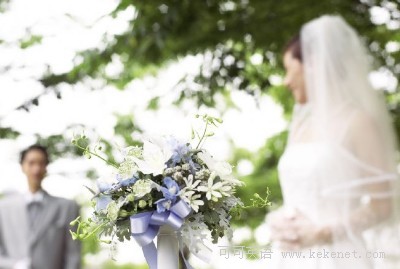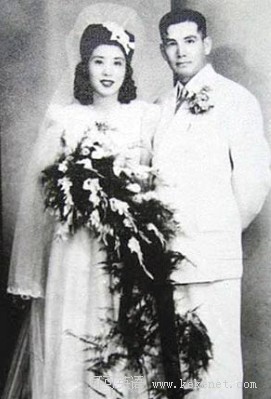(单词翻译:单击)

导读:从“被动婚姻”到“自由恋爱”, 从“速配爱情”再到“丁克”家庭,从“剩女(3S lady)”流行到“我的生活我主宰”……每个年代的婚恋都打上了各自的时代烙印。 新中国成立60年来历经风雨,中国人的婚恋观也发生了翻天覆地的变化。
Attitudes to love and marriage continue to change since the first Marriage Law was introduced in 1950, and have to play catch-up with people's evolving love lives since then.
自1950年中国第一部《婚姻法》颁布之后,人们的婚恋观念一直在转变着;该法自诞生之日起就一直伴随恋人们的脚步,与时俱进着。
Wu Bo, the 55-year-old mother of a 23-year-old unwed son, was taken aback when Ma Nuo, 22, a model from Beijing said on China's most popular TV reality program Don't Bother Me: "I'd rather weep in a BMW than smile on the bicycle of my true love."
22岁的北京模特马诺在热门电视真人秀《非诚勿扰》中说:“我宁愿坐在宝马里哭,也不愿坐在爱人的自行车后座上笑。”这番言论着实使现年55岁的吴波(音译)大吃一惊。她的儿子今年23岁,目前还是单身。
"I don't like to generalize, but Ma's words show that young women today worship money. They won't get married unless their boyfriends have a house and a car. They're so mercenary," Wu says.
吴波说:“尽管我本人不喜欢以偏概全,但是马诺的这番话将当下年轻女性的拜金心理显露无疑。她们是如此的金钱至上——除非男朋友有车有房,否则不会结婚。”

A civil servant in Chengdu, Wu remembers her own younger days in the 1980s as being rosy and romantic.
吴波是成都的一名公务员。回忆起上世纪80年代的那段青春岁月,她表示那是一段浪漫的美好时光。
"Material success was not so important to my generation. Most of my peers wanted to find a mate who was a spiritual match more than one who was materially rich."
“对于我们这代人来说,物质上的成功并不像现在这般重要。对于当时的大多数同龄人来说,我们择偶的条件主要是看彼此是否心心相印,而不是追求物质上的富有。”
"Being materialistic is not our fault. Our whole society is already that way," says Sun Mei, 24, a project officer with a Canadian company in Beijing.
24岁的孙梅(音译)是北京一家加拿大公司的项目主任。她表示:“注重物质生活并非我们的过错。我们整个社会都是这个样子。”
"If I marry a poor man for love, I will lose face, and the quality of my life will be worse than if I were single."
“如果我为了爱情而嫁给一个没什么钱的人,我会很没有面子,我的生活质量也会比婚前低。”

While the freedom to marry for love had become socially acceptable, divorce was not. As in marriage, couples had to get the permission of authorities before they could divorce.
在过去,自由恋爱结婚虽然已经为社会所接受,而离婚则不然。夫妻双方需要得到单位的批准才能离婚。
In 1980, Yu Luojin, a writer in Beijing, filed for divorce, claiming she was no longer compatible with her husband. But, incompatibility was not legal grounds for divorce under the existing Marriage Law. The term incompatibility was so foreign that Yu's appeal triggered a social controversy about the reasons for divorce.
1980年,北京作家遇罗锦声明自己和丈夫之间感情破裂,遂诉请离婚。但在当时的《婚姻法》中“感情破裂”尚无法律依据。“感情破裂”这一术语如此陌生,以至于遇罗锦的申诉引发了社会民众对于离婚原因的广泛争论。
With Yu Luojin's case, the 30-year-old Marriage Law no longer met the needs of the contemporary social landscape.
遇罗锦离婚案说明,已有30年历史的《婚姻法》无法满足当今社会形态的需求。
In 1980, the first amendment to the Marriage Law was issued. Incompatibility was written into the articles of the new Marriage Law.
1980年,《婚姻法》进行了首次修订后颁布。“感情破裂”这一术语被写入了新的《婚姻法》条例中。

"People realized that love could be the reason for a marriage. They gradually gave up the old idea of sex as reserved for having children. They began to see sex as a way of expressing love and affection, and for the pleasure of body and soul," says Chen Mingxia.
陈明霞(音译)表示:“那时人们意识到结婚是为了爱。他们逐渐摒弃了之前‘传宗接代’的两性观念。他们开始将性视为表达爱与情感、追求身心快乐的一种方式。”
Love, affection and enjoyment became the standard by which many people judged the quality of their marriage.
爱意、感情以及快乐成为许多人衡量婚姻好坏的标准。
Later the influence of Western-style sexual liberation affected marriage stability and in the 1990s, some old practices returned.
后来,西方“性解放”对婚姻的稳定性造成了威胁。在上世纪90年代,一些旧习俗再次死灰复燃。
Keeping an er nai, a concubine, or second wife, became a social phenomenon in big cities like Shenzhen, Guangzhou, Beijing and Shanghai. Many young women of low social status were willing to be kept by wealthy older men. Some even bore children with their sugar daddies
在深圳、广州、北京、上海这些大城市中,包二奶成为一种社会现象。很多社会地位不高的年轻女性情愿被上了岁数的富翁包养。一些人甚至为所谓的“干爹”生儿育女。
"This not only jeopardized the legal rights of the women in the marriage. The rights of the er nai and their illegitimate children couldn't be realized either," says Chen Mingxia.
陈明霞说:“这不仅损害了女性在婚姻中的合法权利,二奶及其私生子的权利也无法得到保障。”

The Marriage Law was amended again to meet these new social changes. In 2003, a second amendment to the Marriage Law was issued. In it, cohabitation of a married person with any third party was prohibited. It stipulated that man and wife should be faithful to each other, and respect each other.
为了适应新的社会变化,《婚姻法》经历了第二次修订。2003年修订的《婚姻法》中严令禁止已婚者与他人同居,并明确规定夫妻间要忠于对方,相互尊重。
Nowadays, another remarkable phenomenon in Chinese relationships has emerged, namely shan hun or "lightning marriages". In this case, a couple gets married shortly after their first date.
如今,中国恋人间又出现一种值得注意的现象——闪婚。所谓“闪婚”,指的就是情侣在初次约会后很快步入婚姻殿堂。
Most of the couples who enter into such quick marriages are people born in the 1980s. Unlike their parents, this generation is coming of age in an era of exploding wealth and rising expectations for material success.
大多数选择这种“速食”婚姻的人都出生于上世纪80年代。与他们的父母不同,这代人成长于一个财富暴增的时代,他们对物质成功的期望也是与日俱增。
No specific figures are available for lightning marriages. However, it seems clear that quickie marriages risk a quickie divorce. The latest figures from the Ministry of Civil Affairs reveals that, in 2009, China had 2.48 million divorces, an 8.8 percent rise over 2008. Many were the result of lightning marriages.
关于闪婚的数量还没有一个确切的统计数字。但似乎可以明确的是,闪婚很有可能以“闪离”收场。民政部最新数据显示,2009年,中国离婚人数达到248万人,相比2008年上升了8.8%。其中很多对都是由于闪婚造成的。
"Most 1980s people are only children. They are self-centered and not tolerant in relationships," says Chen. "If they want something, they want it now, the same with their relationships. They are prone to get divorced quickly instead of taking time to improve themselves and become more tolerant."
陈云霞说:“大多80后都是独生子女。他们在与对方相处中过于自我且不够包容对方。他们想要什么东西,就要立刻得到,对待感情也是一样。与其花费时间完善自我,包容对方,他们宁愿选择快速结束婚姻。”


